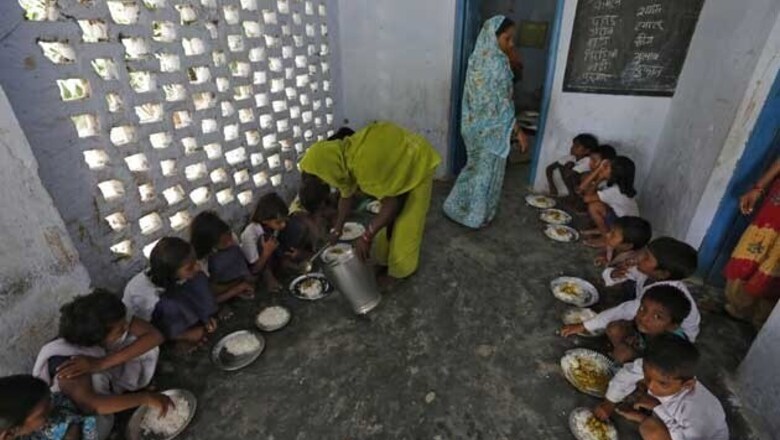
views
Chapra: While political leaders and workers continue with their high-pitch electioneering in Saran district of Bihar where voting will take place on May 7, no candidate of any major political party in the fray has found it worthwhile to visit Dharmasati Gandaman village where 23 children died last year in the mid-day meal tragedy. Even though the village is in Saran district, it comes under the neighbouring Maharajganj Lok Sabha constituency.
Election fever, so visible in other areas, is almost absent in the village but its residents say that they will certainly vote. Their preference is not clear but after having lost their little children, there seems to be a consensus that while they need to move forward and the village needs to develop but the tragedy can and should not be forgotten, for it is the only glue that now binds its residents together.
On July 11, 2013 the children of a primary school in Dharmasati Gandaman village in Saran district of Bihar had been enjoying their day. While some of them were studying in the ramshackle class, others were playing outside. All of them were waiting for the mid-day meal, which was one of the biggest draw for them at the school.
But what happened soon after the meal not only turned the village into a grieving community but also shook the entire state. Even as the meal was being served, some of the unfortunate students who had already started eating complained of foul smell and the almost black colour of soya bean curry. The two cooks Manju Devi and Panu Devi came out in their support but the principal Meena Devi ignored their protests, even admonished and hit some of them forcing the poor students to continue with their poisonous meal.
For the next few hours it was literally the dance of death as 23 small children fell victim to the poisonous soya bean, which was cooked in oil kept in cans of pesticides. Even as several of the children were rushed to Masrakh primary health, then to Chapra and Patna, the death toll kept on mounting.
Even though a majority of Dharmasati Gandaman's residents are Dalits and extremely backward castes, the cruel hands of death snatched children belonging to all castes and communities. Their bodies are buried near the school in a grim reminder of the ill-fated day when the lives of almost everybody in the village changed.
Experts have pointed out how safe and nutritious mid-day meals can go a long way in not only ensuring better attendance and bring down the dropout rate, yet as constituency gets ready to elect its next Lok Sabha MP, the issue has tragically failed to become an election issue. Even the villagers are reluctant to talk about it though they admit that life can never be the same especially with the graves of their children right in the middle of the village.
"Dekhal jai. Humni ke vote daale khatir jayeb. Je hamara khatir kaamwa kari uhe ke vote diyal jayi (We will see. We will go and vote for the person who will work for us)," says Baliram Mishra who lost his 11-year-old son Roshan in the tragedy.
So is the July 11 tragedy not an issue? "Saabe logan ke jatka lagal rahe. Kaise na yaad karin per ose hola. Hamra laikan na nu aayi. Tani kaam hoi to auran ke zindagi bani (Everyone was shaken by the tragedy. How can we not remember it but then what is the use? My son is not going to come back. The lives of others will improve if there is development)," he adds with moist eyes.
Bihar Chief Minister Nitish Kumar announced a slew of development and social security schemes for the villagers after the tragedy but failed to visit them even once. This fact is pointed out by everyone in the village but surprisingly no one holds it against him. The village now has better connectivity thanks to a good road network, electricity which was a luxury earlier is now more regular, there are several hand pumps, a primary health centre has started functioning and even a high school is coming up.
The majority are landless labourers while some of the men work in other cities and states. Most of the land is held by Yadavs and Brahmins but even their economic condition is bad. Some of the migrants are back in the village and they say it is time for change but are not clear what kind of change. They say there is no use in living in the past and the time now is to ensure a better future for their children.
Another villager Manu Sah and his son Raju Sah, too, are eager to vote. "Hamara betwa chal gayil. Abra beri humni ke bhi dekhege ba ki hamara vote se ka badalat ba. (My son died. This time we want to see what difference our votes will make)," Raju Sah, who also lost his son Shiv, says.
But he quickly points out that none of the three main candidates contesting from Maharajganj - RJD's Prabhunath Singh, BJP leader Janardan Singh Sigriwal and Manorajan Singh alias Dhumal Singh of the JDU - have toured the village. Yet he adds that the village will choose one among the three. Others, too, are of the same opinion and say despite the candidates giving their village a miss, they are not very angry with them.
In the Nonia tola of the village there is sharp division on the candidates. The Nonias come under the extremely backward castes (EBC) and the villagers say that their area has been the special focus of the administration. Despite being very poor, their houses now have electricity connection, which was not the case before July 2013. They even have hand pumps and their women don't have to trudge long distances for water now.
Several Nonia men work in other states like Maharashtra, Gujarat, Punjab, Haryana, Delhi and even Tamil Nadu. Their version of developments in other states has made an impact of the voters in the village.
Yet some villagers are of the view that their vote will be cast only on the basis of local issues. "Sabra log kahata vote dale ke. Hamni ke aisan neta chahi je hamni ki gaon ke kaam kari. Badka netwa sab kabhio na aawe la (Every one is saying we must cast our votes. We want a leader who will work for our village. The big leaders never visit us)," says Mahadev Kumar, who has worked for a few years in Punjab as an agricultural labourer but now has a small shop in Dharmasati Gandaman.
A group of BJP workers canvassing in the village are hopeful that their leader will get the maximum votes due to what they called what the apathy of the state government. They squarely blame Nitish Kumar for the filth and squalor in the village.
"Kya kaam karenge? Sarkar bachane mein lage hue hain wo. Time bhi nahi mila unko yehan aane ka. Ab 7 tarikh ko jab button babega to hil jayenge wo (What work will he (Nitish Kumar) do? He is busy ensuring the survival of his government. He never got the time to visit the village. His government will shake when voting takes place on May 7," says BJP worker Chandan Prasad. When asked why no candidate has found the time to visit the village, he turns evasive. "Hum log hain yehan unka jagah (We are here to represent him),' he says.
Near the graves of the children, a group of women are praying. One of them is Manju Devi who lost her three children in the tragedy. When asked about the tragedy and elections, she simply walks off with teary eyes. Her friend Manjari Devi speaks on her behalf.
"Kath ho gayil biya (She is emotionless now)," she says and adds that whatever the outcome of the elections, their village will always be known as the one where "Yumraj" (the god of death) came down to take away all the happiness.
Whatever be the result on May 16, it is clear that Dharmasati Gandaman will have to wait a little longer for an elected representative who will empathise with them.















Comments
0 comment